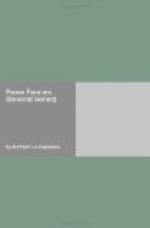‘You’ve heard of old Lord Osterley,’ he presently began again. ’Well, congratulate me, old man: he has just died and left everything to me. You know what a splendid library he had—to think that that will all be mine—and that grand old park through which we’ve so often wandered, you and I! Well, we shall need fear no gamekeeper now, and of course, dear old fellow, you’ll come and live with me—like a prince—and just write your own books and say farewell to journalism for ever. Of course I can hardly believe it’s true yet. It seems too much of a dream, and yet there’s no doubt about it. I had a letter from my solicitors this morning, saying that they were engaged in going through the securities, and—and—but the letter’s somewhere over there; you might read it. No? can’t you find it? It’s there somewhere about, I know. Never mind, you can see it again....’ he finished wearily.
‘Yes!’ he presently said, half to himself, ’it will be a wonderful change! a wonderful change!’
* * * * *
At length the time came to say good-bye, a good-bye I knew must be the last, for my affairs were taking me so far away from him that I could not hope to see him for some days.
‘I’m afraid, old man,’ I said, ’that I mayn’t be able to see you for another week.’
’O never mind, old fellow, don’t worry about me. I’m much better now—and by the time you come again we shall know all about the securities.’
The securities! My heart had seemed like a stone, incapable of feeling, all those last unreal hours together; but the pathos of that sad phrase, so curiously symbolic, suddenly smote it with overwhelming pity, and the tears sprang to my eyes for the first time. As I bent over him to kiss his poor damp forehead, and press his hand for the last farewell, I murmured—
‘Yes—dear, dear old friend. We shall know all about the securities....’
THE BOOM IN YELLOW
Green must always have a large following among artists and art lovers; for, as has been pointed out, an appreciation of it is a sure sign of a subtle artistic temperament. There is something not quite good, something almost sinister, about it—at least, in its more complex forms, though in its simple form, as we find it in outdoor nature, it is innocent enough; and, indeed, is it not used in colloquial metaphor as an adjective for innocence itself? Innocence has but two colours, white or green. But Becky Sharp’s eyes also were green, and the green of the aesthete does not suggest innocence. There will always be wearers of the green carnation; but the popular vogue which green has enjoyed for the last ten or fifteen years is probably passing. Even the aesthete himself would seem to be growing a little weary of its indefinitely divided tones, and to be anxious for a colour sensation somewhat more positive than those to be gained from almost imperceptible nuances,




